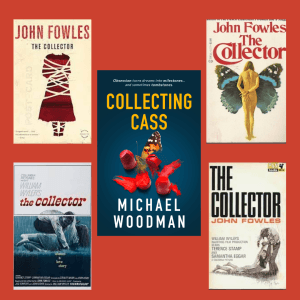
These days, they don’t make victims like they used to. So says Cass in Collecting Cass, my 21st century reimagining of the classic themes in John Fowles fabled yarn, The Collector.
Published in 1963, The Collector launched John Fowles’ stellar career. It earned critical acclaim for its chilling portrayal of obsession and continues to be a touchstone for psychological thrillers. Its themes of control, isolation, and the dehumanizing effects of obsession resonate deeply, even today.
But how has it dated?
The book’s real genius was timing. Try selling Fred and Miranda’s story to a publisher in 2024 and see how far you get. For those who haven’t read it, you’ll find plenty of summaries online. But here’s a handy update stripped of puffery and tuned to 21st-century readers: Fred, a socially and sexually dysfunctional loner, abducts Miranda, a classic 60s victim. He holds her captive, tormenting and degrading her while claiming to respect and desire her. She makes futile escape efforts and passes her time scribbling daydreams about an older man mentor/lover. Fred kills her inadvertently, then buries her in the garden and goes looking for a more suitable girl.
Very few books from the 60s stand up today.
So, let’s start with the tagline. How about… Love Story for sickos. Okay, that’s harsh. Very few books from the 60s stand up today, and I wince at the darlings I sprinkled throughout my pulpy spy fiction of that vintage. Bad guys like Fred making out like bandits were the norm then, and when it came to portraying female characters, templates were de rigueur. These were the options: sex object, ornament to decorate a man’s story, or punch bag to prove his manliness. In The Collector, Fowles got all three and Hollywood was watching. The rights sold with the ink still wet on the first print run, and William Wilder’s 1965 movie hoovered up awards at Cannes and the Oscars. It cleaned up at the box office too, making it a phenomenal success for a first novel. Fowles stock soared, and as a former English teacher, he knew how to hype his work and cozy up to the literati. So those early reviews dismissing The Collector as a mere thriller were soon swept aside and replaced with love notes declaring it a literary classic. His reputation only grew from there, surviving his screenplay of the Magus, and remaining unsullied by the book’s association with serial killing sprees in the real world.

I read the book as a schoolboy in the 60s, and on rereading it recently, I was struck by the shift in gender power dynamics since then and how that is reflected in art. Clearly, a reimagining was overdue, and I was just the lad to do it.
Since Fowles work is in copyright, my first step was an exchange with a copyright lawyer who wrote me, “copyright law protects the expression of ideas, it does not protect the underlying concepts or themes. As long as you create a new expression with significant changes to the setting, characters, plot developments, and outcomes, you are free to craft your own narrative.” No worries then. Completely different was the whole point of the exercise. My aim was to pay homage to Fowles’ exploration of these dark themes while updating the narrative to reflect contemporary issues and sensibilities.
My story complete, I needed a cover, and checking out The Collector’s many imprints was an obvious place to start (see above). These covers tell us a lot about their age and remind us that once upon a time all books were browsed on a bookshelf or spied through a bookshop window. Most of them portrayed Miranda as helpless, a fragile figure at the mercy of her captor, everything I didn’t want. I sent every cover I could find to Mila, my designer, with copious notes, and I was delighted with her creation… the broken butterfly, blood red smears and lipsticks shaped like bullets.
Collecting Cass acknowledges the grim reality of abduction and obsession but also highlights the potential for survival, transformation, and justice. I wanted to underline how far we’ve come in our portrayal of women and sneak the message through in a breathless story that kept readers hooked to the last page. In the end, Cass surprised even me. But so what if she turned out to be more predator than prey, or as one reader put it, “a little bit… unethical.” The fact is they don’t make victims like they used to.